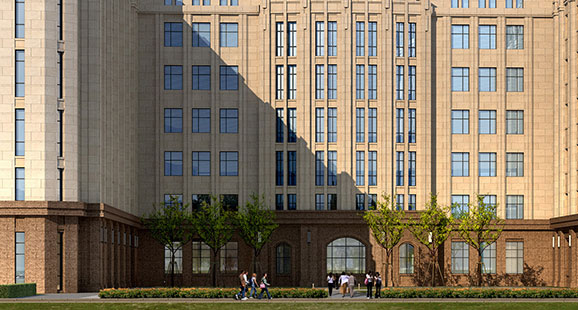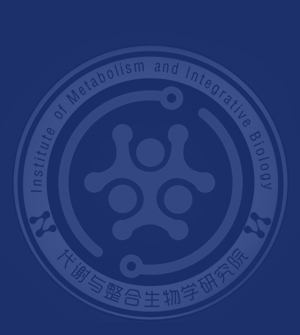

 Professor
Professor
Tel: 0086-21-31246730
Email: stevenhou@fudan.edu.cn
Office Address: Room A401-7, Building of Life Sciences, Fudan University
Personal Profile
2020-now Professor, School of Life Sciences and Institute of Metabolism and Integrative Biology, Fudan University
2013-2019 Tenured Senior Investigator, Center for Cancer research, National Cancer Institute of NIH
2006-2012 Tenured Senior Investigator, Mouse Cancer Genetic Program, National Cancer Institute of NIH
1997-2005 Tenure-track Principal Investigator, the Laboratory of Immunology, National Cancer Institute of NIH
1994-1997 Postdoctoral fellow in the laboratory of Dr. Norbert Perrimon, Department of Genetics, HHMI, Harvard Medical School, Boston, Massachusetts
1994 Ph.D. Department of Molecular Genetics and Cell Biology, the University of Chicago
1986 M.Sc. Shanghai Institute of Biochemistry, Academia Sinica, China
1983 B.Sc. Lanzhou University, Lanzhou, China
Research Interests
Stem cells, lipid metabolism and immune responses in developmental, tumor, and neurodegenerative diseases.
Stem cells are the central cells of normal biological development and aging, and are the key resources of regenerative medicine. Cancer stem cells (CSCs) exist in most cancers and may be responsible for tumor metastasis, disease recurrence, and eventually patient death. Little is known about stem cell maintenance, quality regulation, and signaling with the external environment. In a paper published in Nature (2016), we found that stem cells, including cancer stem cells, are metabolically unique, like hibernating animals, and rely heavily on the energy of lipid reserves. So that ablation of the Arf1-mediated lipid metabolism results in lipid droplet accumulation and metabolic stress, which promotes stem cell necrosis. In a recent paper published in Nature Communications (2020), we found that ablation of the Arf1 pathway could kill two birds with one stone: not only did it kill CSCs from inside, but it also released danger signals to activate a tumor-specific immune response in which dying CSCs were converted into a therapeutic vaccine to attract and activate immune cells for destroying the bulk tumors and resulting in durable efficacy of the treatment. In mouse brains, blocking the Arf1 pathway activated neuroimmune communications, leading to neurodegenerative diseases. Our research system provides new opportunities to explore the interactions among lipid metabolism, stem cells and immune responses in development and human diseases. While we are exploring the specific molecular mechanisms of the system, we are also using the system as a basis for finding new drug targets for the treatment of cancer and neurodegenerative diseases
Honors and Awards
2017 National Institutes of Health Science Breakthrough Team Award
2009 NCI Director Innovation Award
2006 Works on the tumor suppressor gene BHD were selected as the National Cancer Institute's Annual Best Results
1997 Charles Harkin Cancer Research Award
1996 Leukemia Society of America Postdoctoral Fellowship
1996 National Institutes of Health Postdoctoral Fellowship
1996 The Medical Foundation Postdoctoral Fellowship
Selected Publications
Wang G, Xu J, Zhao J, Yin W, Liu D, Chen W, Hou S X. Arf1-mediated Lipid Metabolism Sustains Cancer Stem Cells and Its ablation Induces Anti-tumor Immune Responses in Mice. Nat. Commun., 2020, 220. (Editors' Highlights)
Singh S R, Zeng X, Zhao J, Liu Y, Hou G, Liu H, Hou S X. The Lipolysis Pathway Sustains Normal and Transformed Stem Cells in Adult Drosophila. Nature, 2016, 538: 109-113.
Liu Y, Ge Q, Chan B, Liu H, Singh S R, Manley J, Lee J, Weidenman A M, Hou G, Hou S X. Whole-animal genome-wide RNAi screen identifies networks regulating male germline stem cells in Drosophila. Nat. Commun., 2016, 7: 12149.
Singh S R, Liu Y, Zhao J, Zeng X, Hou S X. The novel tumour suppressor Madm regulates stem cell competition in the Drosophila testis. Nat. Commun., 2016, 7: 10473.
Zeng X, Han L, Singh S R, Liu H, Neumüller R A, Yan D, Hu Y, Liu Y, Liu W, Lin X, Hou S X. Genome-Wide RNAi Screen Identifies Networks Involved in Intestinal Stem Cell Regulation in Drosophila. Cell Reports, 2015, 10: 1226-1238.
Zeng X, Hou S X. Enteroendocrine cells are generated from stem cells through a distinct progenitor in the adult Drosophila posterior midgut. Development, 2015, 142(4): 644-653.
Zeng X, Lin X, Hou S X. The Osa-containing SWI/SNF chromatin-remodeling complex regulates stem cell commitment in the adult Drosophila intestine. Development, 2013, 140(17): 3532-3540.
Zeng X, Hou S X. Broad relays hormone signals to regulate stem cell differentiation in Drosophila midgut during metamorphosis. Development, 2012, 139(21): 3917-3925.
Ande S, Orri K, Chen X, Coppola V, Tessarollo L, Keller J R, Hou S X. RapGEF2 is essential for embryonic hematopoiesis but dispensable for adult hematopoiesis. Blood, 2010, 116: 2921-2931.
Singh S R, Liu W, Hou S X. The adult Drosophila Malpiphian Tubules are maintained by multipotent stem cells. Cell Stem Cell, 2007, 1(2): 191-203.
Wang H, Singh S R, Zheng Z Y, Oh S W, Chen X, Edwards K, Hou S X. A Rap-GEF/Rap GTPase signaling controls stem cell maintenance through regulating adherens junction positioning and cell adhesion in Drosophila testis. Dev. Cell, 2006, 10: 117-126.
Chen X, Oh S W, Zheng Z, Chen H W, Shin H H, Hou S X. Cyclin D-Cdk4 and Cyclin E-Cdk2 regulate the JAK/STAT signal transduction pathway in Drosophila. Dev. Cell, 2003, 4: 179-190.
Chen H W, Chen X, Oh S W, Marrinissen M J, Gutkind J S, Hou S X. Mom identifies a receptor for the Drosophila JAK/STAT signal transduction pathway and encodes a protein distantly related to the mammalian cytokine receptor family. Genes Dev., 2002, 16: 388-398.
Hou S X, Goldstein E S, Perrimon N. Drosophila Jun relays the JNK signal transduction pathway to the DPP signal transduction pathway in regulating epithelial cell sheet movement. Genes Dev., 1997, 11:1728-1737.
Hou S X, Melnick M B, Perrimon N. Marelle acts downstream of the Drosophila Hop/JAK kinase and encodes a protein similar to the mammalian STATs. Cell, 1996, 84: 411-419.
Hou S X, Chou T B, Melnick M B, Perrimon N. The torso receptor tyrosine kinase activates raf in a Ras-independent pathway. Cell, 1995, 81: 63-71.



 Fudan Email
Fudan Email Fudan Ehall
Fudan Ehall